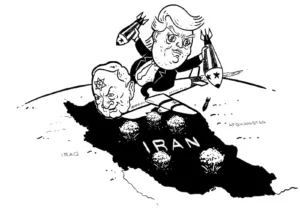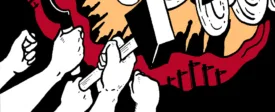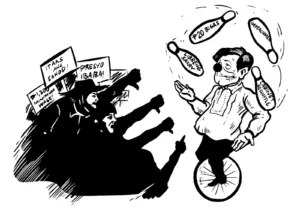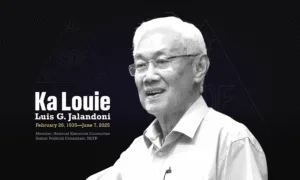Introduction
The Marcos regime and its armed forces have intensified ferocious attacks and repression against the Filipino people over the past year. Bloodshed and widespread human rights violations have been documented, all in the name of the regime’s goal to crush the revolutionary movement on its readjusted target of 2024 yearend. To illustrate these cases and contribute to the campaign for justice, Ang Bayan (AB) is releasing this report on the country’s state of human rights over the past year.
This report is based on information gathered and analyzed by AB regarding human rights violations committed by the Armed Forces of the Philippines (AFP), Philippine National Police (PNP), and other armed agents of the US-Marcos regime from December 1, 2023, to December 1 of this year. It describes the intensity of brutality and violence experienced by the Filipino people under the US-Marcos regime’s ongoing counter-insurgency and suppression campaigns.
As in the past, many cases in rural areas remain unreported due to the difficulty of units sending reports amid intense military operations. Some are only reported as incidents without indicating the exact number of victims.
This current report also does not fully cover the numerous human rights violations against the Moro people, which are often not publicized. Also excluded are the extrajudicial killings under the Duterte regime’s false war on drugs perpetuated by the current regime. The Dahas Project reported at least 370 victims under this false war since Ferdinand Marcos Jr came to power.
In this report, AB used international standards for estimating the number of victims of evacuation and militarization, as well as the number of affected children.
Policy of repression
Despite Ferdinand Marcos Jr’s efforts to take advantage of the exposure of the Duterte regime’s dirty and bloody record and to rehabilitate his family’s evil reputation, he cannot hide his own brutal and fascist rule in perpetuating the previous regime’s repression campaigns. He mobilizes fascist institutions and agencies from the national to the barangay level to suppress anyone who opposes his inutile and rotten rule.
In January, Marcos launched the slogan “Bagong Pilipinas” (New Philippines), similar to his dictator father’s “Bagong Lipunan,” as a smokescreen to hide the rotteness of the state. However, there is nothing fundamentally “new” in the oppressive and exploitative neocolonial and feudal system in the Philippines. The Marcos family continues to bask in power, reclaim all the wealth it has stolen, and rule using state terrorism.
Marcos also established in May the Special Committee on Human Rights Coordination through Administrative Order No. 22 which empowers the committee to serve as a “coordinator” on human rights issues. He established the Inter-Agency Committee on International Humanitarian Law (IAC-IHL) through Executive Order No. 77 signed on November 22. He launched the National Human Rights Action Plan (NHRAP) in December. These are desperate attempts to prettify the dire state of human rights in the country.
Behind these orders, the AFP and PNP hasten the ruthless implementation of an dirty total war against the Filipino people in the urban and rural areas. Under the National Security Policy (NSP) 2023-2028 framework, intense fascist state terrorism, subservience to US imperialism, and suppression of patriotic and democratic forces continue.
Despite repeated rhetoric by the US, AFP, and Marcos on “shifting” the country’s armed forces from “internal defense” to “external defense” because the New People’s Army (NPA) has been “weakened” or “defeated,” the majority of the AFP’s forces remain in the countryside and guerrilla zones. They repeatedly claim that there are only seven weak guerrilla zones left, but thousands of military, police, and paramilitary forces are still being mobilized for the counter-insurgency campaign. The AFP continues to dominate civilian agencies and local governments down to the barangay level through the National Task Force-Elcac.
Marcos weaponizes the Anti-Terrorism Law and the Terrorism Financing Prevention and Suppression Act to suppress and silence critics and those expressing opposition to his regime, even ordinary citizens. In the last quarter of the year, the Marcos regime was exposed using a so-called “Project Exit the Greylist” to arbitrarilly charge various organizations and development groups in the country with “terrorism financing”. This operates in tandem with a 2021 “Order of Battle” list targetting prominent church figures, development workers, and activists for indictment.
The regime targets what it tags “CPP-NPA-NDFP legal fronts” to supposedly “halt recruitment, sever financial support, and combat propaganda.” This is accompanied by maliciously linking activists to the armed movement or Red-tagging to justify violent attacks on them.
In the countryside, communities are subjected to intensified militarization and occupation in the form of focused military operations (FMOs) and occupation of barangays under the veil of the Retooled Community Support Program (RCSP). In these operations, military violence and repression primarily target civilians and peasants. This is accompanied by indiscriminate aerial bombings, strafing, and artillery shelling in fields and mountains, which endanger the lives of civilians and destroying the environment.
The NTF-Elcac implements the “Balik-Loob” (reintegration) and “Barangay Development Program” in rural communities, which are actually campaigns to intimidate, force civilians to “surrender”, and embezzle public funds. The state also continues to wantonly violate the laws of war, in the form of deliberate killing of wounded fighters, murder of civilians in “fake encounters,” and putting entire communities under lockdown during combat operations.
Human rights violations
Ang Bayan (AB) documented 83,560 victims of human rights violations by the US-Marcos regime from December 2023 to December 1, 2024. AB recorded 975 cases (or almost three cases per day) of human rights violations across the country. Many victims experienced 2-3 human rights violations.
On average, at least five political killings are recorded monthly. There is one victim of enforced disappearance and almost one victim of torture each week. AB recorded 60 victims of threats, intimidation, and harassment each day. Military occupation in the countryside forcibly evacuated and displaced at least 20,396 people. There were 67 cases of aerial bombings, strafing, and bombings that endangered, terrorized, or disrupted the livelihoods of thousands of civilians.
As in previous reports, the majority of victims come from the peasant sector (66,701), followed by the children (27,292) and urban poor (16,500).

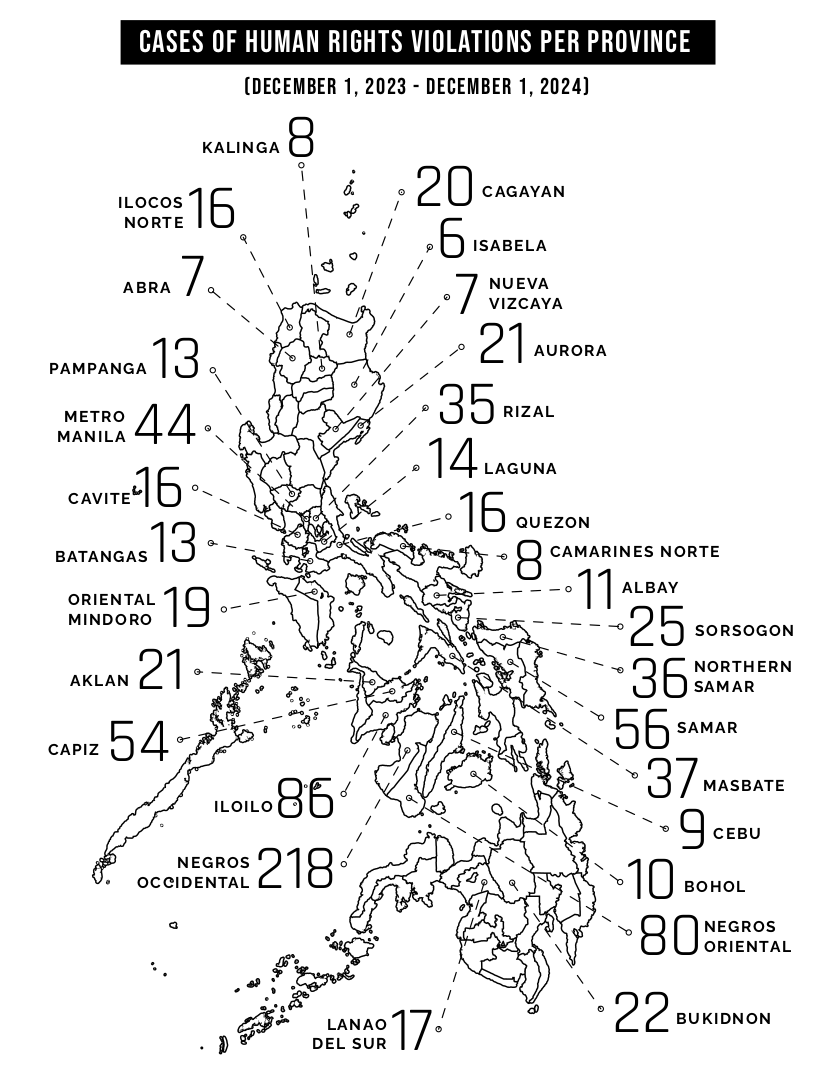
In almost three years of the Marcos regime in power, AB has recorded a total of 3,082 cases, victimizing at least 508,239 individuals. On average, there have been 574 victims of human rights violations per day for almost three years. Under the Marcos regime, the National Union of Journalists of the Philippines (NUJP) has recorded a total of 156 cases of violations of press freedom.

Extrajudicial killings, frustrated killings, and torture
There were at least 56 extrajudicially killings nationwide in the past year. Majority of these cases occurred during focused military operations (FMOs) and RCSP operations conducted in peasant and indigenous peoples communities. Extrajudicial killings were highest in Negros Occidental (16), followed by Masbate (10), and Iloilo (6).
Nearly all of the deaths have been falsely reported by the AFP as killed in the fake encounters. The AFP disseminates these false reports despite strong protests from families, neighbors, and even local barangay council officials. New People’s Army (NPA) local units swiftly deny these false reports.
To project the false impression of having been killed in encounters, the bodies of those killed are dressed in NPA garb, planted with weapons, ammunition, and other military equipment, and positioned in the mud. As in the past, the military continues to take photos of their remains and post these on social media to be feasted on by their trolls.
The killings are aligned with the Marcos regime’s plan to “completely crush” the people’s army in the country. Soldiers spread stories of their “victories” to project the people’s army’s “defeat”.
Among the victims, 17 were hors de combat, non-combatants, or revolutionary movement retirees. They were all arrested by AFP units but were deliberately killed by the butchers instead of being declared as prisoners of war.
Killing of ordinary farmers. On September 26, 2nd IB soldiers killed farmers Roger Clores and Ronnel Abril in Purok 3, Barangay Simawa, Uson, Masbate. Residents said the victims were simply tending to a carabao by the river when the military killed them. As its usual modus operandi, the 2nd IB reported having encountered an NPA unit in the area at 5:40 AM, ang exchanged gunfire for about 20 minutes. They claimed having killed the two farmers and seized various firearms and military equipment during the made-up encounter.
Killing of an elderly person. On July 29, 15th IB soldiers and Philippine National Police-Special Action Force (PNP-SAF) personnel abducted, took to the forest, and then deliberately killed 69-year-old farmer Ramon Enseniales in Cauayan, Negros Occidental. The 15th IB claimed that Enseniales was a Red fighter killed in an armed encounter. A resident witness said soldiers surrounded the house where Enseniales lived in Sitio Pasto, Barangay Basak, abducted him and took him to the forest. After a few hours, residents only heard a series of gunshots. The elderly man is believed to have been subjected to severe torture before being killed at around 1 p.m.
Killing of hors de combat fighters. On July 18, the 80th IB deliberately killed Wally Agudes (Ka KM), a member of NPA-Rizal who was sick, in Barangay Burgos, Rodriguez, Rizal. Witnesses said they saw Ka KM alive, trying to run away from the approaching soldiers. They also heard Ka KM shout that he would not fight and a soldier shouting for someone to get down. Ka KM had a severe flu that kept him in the community. He could not properly walk and was not in a position to fight.
Red fighter Kaliska Dominica Peralta (Ka Rekka) met a similar ordeal. On April 10, the 48th IB’s fascist troops tortured and killed Ka Rekka after capturing her in Barangay Butong, Quezon, Bukidnon. She was unarmed when arrested. Ka Rekka was a former student from the University of the Philippines-Diliman.
There were also grave violation of international humanitarian law in the case of the Panay martyrs who were killed in August. Maria Concepcion Araneta-Bocala (Ka Concha), Vicente Hinojales (Ka Hadjie/Ka Emil), Benjamin Cortel (Ka Amor/Ruby/Mamang), Romulo Iturriaga Gangoso (Ka Reagan/Biboy/Pedik), Jielmor Gauranoc (Ka Doc/Tango/Baron), Juvylene Silverio (Ka Kaykay/Purang), Armando Savariz (Ka Nene/Kulot), and Rewilmar Torrato (Ka Minerva/Mara/Moray) were martyred in a series of defensive actions from August 5 to 15 in Iloilo. The martyrs’ families’ said they noticed unusual marks on the remains upon their retrieval of the bodies from the funeral home. They observed various types of injuries, including large and small chest wounds, broken arms, and extensive bruising from head to toe. These injuries strongly indicate that the victims were subjected to severe pain and torture before being killed.
AB recorded 27 victims of frustrated killings in Kalinga, Nueva Ecija, Aurora, Albay, Sorsogon, Negros Occidental, Northern Samar, Samar, and Sultan Kudarat. These cases involved operating military units, who, out of fear of being fired upon, indiscriminately shot anyone they encountered in the forest or on the road. Among the victims was a four-month pregnant woman.
Soldiers tortured at least 44 people. Nearly half of the torture victims were subsequently killed by the military executioners. Among the victims were two pregnant NPA fighters who were tortured and ill-treated upon arrest. Other torture victims included farmers subjected to intense interrogation while others were arbitrarily targetted by soldiers in combat operations.
Arrests, abductions, and threats, harassment, and intimidation
AB documented 65 cases of arbitrary arrest and detention against at least 149 victims, mostly farmers. Various trumped up charges were filed against the victims to prolong their imprisonment. Charges commonly include illegal possession of firearms and explosives, murder and frustrated murder, terrorism, and “terrorism financing.”
Court documents for some of those arrested were deliberately delayed to prevent their immediate release. In some cases, especially in the provinces, they are illegally detained in military camps without court orders and are not allowed family visits.
Situation of political prisoners. Political prisoners continue to proliferate under the Marcos regime’s campaign of arrests against activists and progressives. Karapatan records 757 political prisoners in the country, 103 of whom are elderly and 97 are sick, 156 are women, and 17 are National Democratic Front of the Philippines (NDFP) peace consultants and staff.
Deaths of political prisoners in custody resulting from prolonged detention, poor prison conditions, and neglect of their medical needs have been recorded in the past year. These include Jude Rimando, 58, a veteran labor organizer, who died on July 23 due to Stage 4 liver cancer. He was arrested on January 6, 2021, and detained at the Metro Manila District Jail-Annex 2 in Camp Bagong Diwa, Taguig City.
Mass arrests of indigenous peoples. A joint force of police and Hacienda Almeda’s private security and thugs arrested at least 29 Mangyan-Iraya hacienda residents in Abra de Ilog, Occidental Mindoro on October 18. Those arrested included 17 elderly and 12 minors defending their ancestral land. Hacienda Almeda is part of the Iraya people’s 31-hectare ancestral land being seized from them through harassment, militarization, and deception using armed thugs and state agents.
Brutal arrests at protests. On November 30 at Mendiola, the Manila police illegally arrested senior citizen and Bayan Muna organizer Nilo Mortifero who had just recovered from a stroke. Ka Nilo was arrested while walking to the restroom. Police filed charges against him, along with Kilusang Mayo Uno (KMU) chairman Ka Elmer Labog, and other activists.
“Terrorism financing” charges. The latest Defend NGOs alliance report cited that 69 individuals and 29 non-government organizations (NGOs) nationwide have experienced harassment and are facing fabricated cases related to “terrorism financing” under the current administration. This is apart from those charged with outright “terrorism.”
Anti-JASIG arrests of NDFP consultants. In October, the Marcos regime arrested three NDFP peace consultants in violation of the Joint Agreement on Safety and Immunity Guarantees (JASIG). Police and the military arrested Wigberto Villarico on October 24; Simeon Naogsan on October 21; and Porferio Tuna on October 2. All were performing NDFP tasks and conducting consultations with mass organizations when state forces arrested them. These arrests are deliberate attempts to sabotage the possible resumption of peace talks between the GRP and NDFP, as agreed in the Oslo Joint Statement of November 2023.
AB recorded 70 victims of enforced disappearances in the past year. These cases are characterized by the state’s clear intention to hide and deny holding the victims in custody. Some of the victims turn up dead after a prolonged disappearance, some are detained under fabricated charges or as “surrenderers” from the people’s army.
Abduction of a newly released political prisoner. Rowena Dasig has been missing for two months after state forces abducted her on August 22, the day of her “release” from prison. Prior to her forced disappearance, a court in Gumaca, Quezon, had dismissed the case of illegal possession of firearms, ammunition, and explosives against her and Miguela Peniero. Both were arrested in Purok Banaba, Barangay Caridad Ibaba, Atimonan on July 12, 2023.
Abducted Bicol activists. In Albay, state forces abducted James Jazmines, 63, a former Kilusang Mayo Uno official and brother of NDFP peace consultant Alan Jazmines, on August 23. He was last seen in Barangay San Lorenzo, Tabaco City. A student-youth activist, Jazmines served as KMU information officer and Amado V. Hernandez Resource Center executive director. He has been working as an IT consultant since the mid-2000s.
A few days later, on August 28, 66-year-old Felix Salaveria Jr, an active Cycling Advocates (CYCAD) member, was also abducted. Salaveria has been seen cycling often with Jazmines. He was a founding member of the Tunay na Alyansa ng Bayan Alay sa mga Katutubo and Kabataan para sa Tribung Pilipino in the 1980s.
Under the Marcos regime, AB has recorded 233 victims of enforced disappearances. Of these, at least 43 remain missing and have not been located. Meanwhile, 32 of those disappeared were killed, 29 were detained, 10 were released as “surrendered,” and 68 were surfaced but face relentless state harassment. Ten of the victims were children taken hostage by the military. Many of these cases were recorded in rural areas during intense military operations.
AB has documented at least 22,223 victims of threats, harassment, and intimidation. The primary victims of such violations are farmers who are being driven off their land by landlords and land grabbers in collusion with state forces.
This number is even higher if it included the thousands of people the military forcibly “surrendered” as members or supporters of the New People’s Army (NPA) in the rural and countryside areas. In cases of forced “surrenderers,” the military often employs aid distribution to photograph residents and falsely claim that they “surrendered.”
Individuals and organizations are continuously suppressed through red-tagging, vilification, and baselessly linking them to the armed movement. This despite the Supreme Court’s May decision clearly declaring that red-tagging is a threat to life, freedom, and safety. Incidents of hanging posters implicating mass leaders to the revolutionary movement, and holding meetings in schools and communities solely aiming to red-tag national-democratic organizations, and widespread social media vilification continue to be recorded.
Harassment of martyrs’ families. One form of harassment by state forces against the families of Red fighters is the denial of their access to the remains of martyrs and relentless harassment. One such case is the harassment of the Ritual family.
The family of Susan Ritual (Ka Gemma), who was martyred in Barangay Bacong Sigsigan, Famy, Laguna on November 28, was subjected to harassment and, for almost a week, prevented from retrieving her remains for wake and proper burial. To add insult to the injury, the soldiers abducted and detained Ka Gemma’s two siblings, Paulino and Sherlyn Ritual, who were only trying to retrieve her remains. The police forcibly seized and “took home” the remains along with the Ritual siblings to Aurora. Soldiers did not leave even at Ka Gemma’s wake and burial.
Military terror in communities
In its desperate drive to completely crush the revolutionary movement in the countryside or at least maintain the declared “insurgency-free” status of provinces, AFP and PNP combat operations continue in many rural communities. Battalions of military and police forces continue to encamp in many farmers and indigenous peoples communities.
AB documented at least 20,396 victims of forced evacuation and displacement in the past 12 months. The AFP soldiers’ use of civilian structures, which is a violation of international humanitarian law, have disrupted the schooling of 1,822 children and the general lives of a total of 5,281 people.
In total, AB has recorded 67 cases of aerial bombings, strafing, and bombings in Abra, Kalinga, Ilocos Sur, Cagayan, Nueva Vizcaya, Aurora, Nueva Ecija, Quezon, Camarines Sur, Northern Samar, Samar, Capiz, Iloilo, Negros Occidental, and Bukidnon. Over 13,000 people have been affected.
Violations of women’s and children’s rights
AFP and PNP brutality in the dirty counter-insurgency war against the revolutionary movement is unparalleled. Nationwide, many children and women have been victims of military operations and are deliberately targeted by the armed state forces.
According to AB’s records, soldiers killed a minor, while indiscriminate firing, artillery shelling, and aerial bombings near communities have forced the evacuation and displacement of hundreds.
Killing of a 16-year-old. On June 9, the 7th IB killed 16-year-old student Eusibio Cranzo, also known as Kuni Cuba, in Sitio Kiluding, Barangay Kiadsam, Sen. Ninoy Aquino, Sultan Kudarat. Cranzo was reportedly returning home with his brother and two friends when the 7th IB operating unit accosted them. The soldiers immediately shot Cranzo while his three companions scampered into the adjacent corn field.
Child abduction. On an unspecified date in May, state forces arrested Baby Arnejo and her child in Barangay Madao, Uson, Masbate. She was charged with being a member of the NPA, despite residents insisting that she was a civilian and had lived long in the area. The police attempted to abduct her child but were prevented by the community. Due to the community’s efforts, the child was placed in proper custody while her mother remained in detention.
AB has also recorded four cases of rape and sexual abuse against women, including cases in Batangas, Northern Samar, and Metro Manila. The AFP also repeatedly shot at a pregnant woman in Aurora.
Justice Now!
The Filipino people collectively cry justice for all the US-Marcos regime’s victims of human rights violations. In defense of human rights, sectors have held various forms of mass struggles over the past year.
In the year’s second half, the Duterte regime’s crimes in its fake war on drugs became the focus of congressional investigations. Congress was pushed to include the previous regime’s cases of extrajudicial killings of activists, human rights and environment defenders, and many others. In November, victims and their families formed the Duterte Panagutin (hold Duterte accountable) alliance, including former Senator Leila de Lima, who was detained by Duterte for over seven years on fabricated charges that were all eventually dismissed by the courts. At the same time, mothers formed the Mothers for Justice under Gabriela. These groups demanded for a deeper investigation into Duterte’s crimes. They also hold the Marcos regime accountable for its slow and zero support for victims, including its own victims of violence. They urged the state to cooperate with the International Criminal Court, if not rejoin as a member.
Through continuous campaigns and the dedicated efforts of families and lawyers, some political prisoners have been released for the lack of evidence in the trumped-up cases filed against them. This includes the release of Gerardo Dela Peña, the oldest political prisoner, in June, and the dismissal of cases against the “Himamaylan 7” in November. Almost all cases filed under defective search warrants issued by Judge Cecilia Villavert have been dismissed.
This year also saw a series of strikes and mass actions by workers and unions to demand higher wages, workplace rights, and the ratification of new collective bargaining agreements (CBAs). Notable actions took place at Nexperia Philippines Inc., Daiwa Seiko Philippines, Technol Eight Philippines, and others.
The people and human rights defenders continue their militant struggle to resist the brutal rule of the Marcos regime. From legal and extralegal actions to the armed actions of the New People’s Army, the people continue to fight for the defense of their rights and the attainment of justice. They expose, resist, and hold Marcos accountable for his policies of repression and state terrorism.



